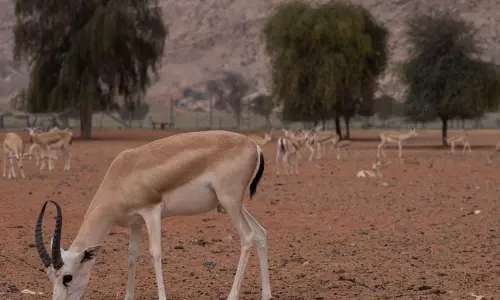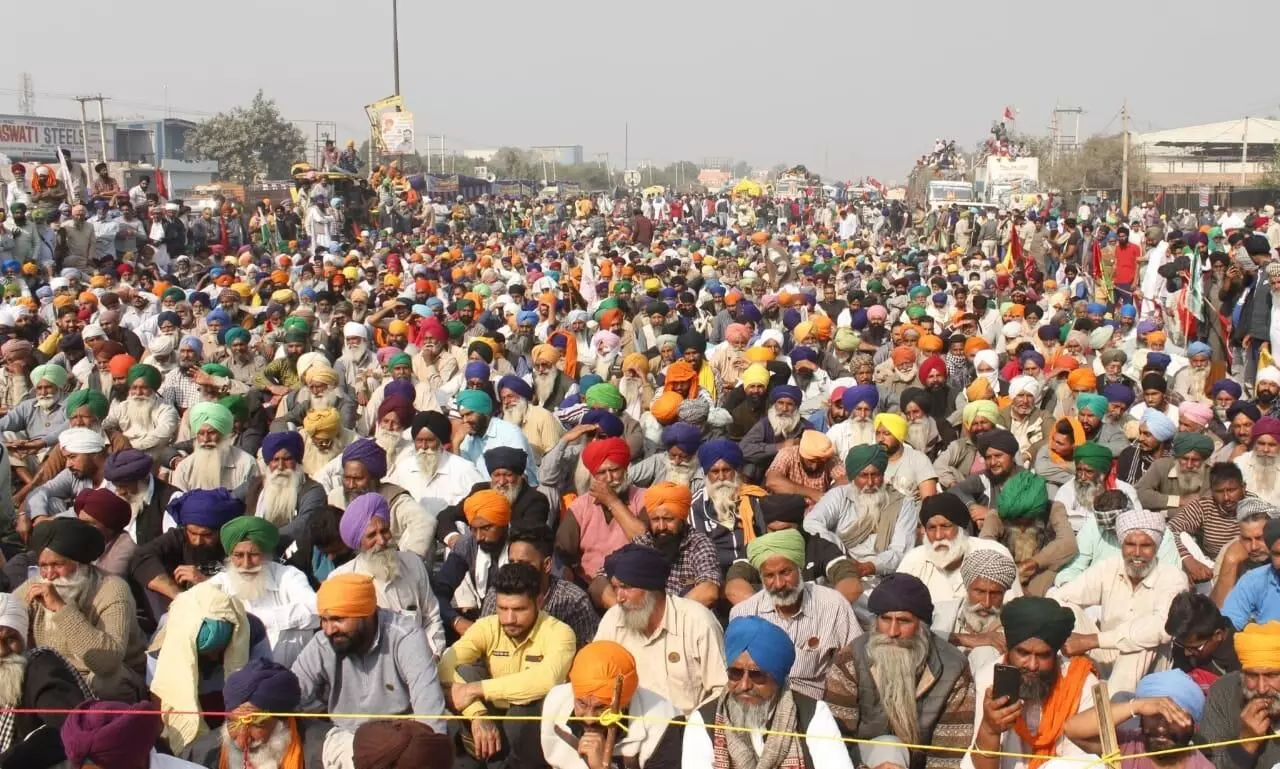
Farmer agitation: not just a storm in a tea cup
text_fieldsA view of the protesters during the farmers strike in Delhi
In Shambhu, along the Punjab-Haryana road, a barricade was raised with cement divider across the road. In Karnal, about 150 trucks were parked blocking the high way. In Panipat and Sonipat, deep tunnels were dug along the national highway. Still security forces could not suppress farmer rage and they tried using water canons, baton and grenade to ward off the protesters. And then, as it happens to justify any move to victimise anti-government protests, the central government employed pliant fascist media entities to slap on them the terrorist label. This is roughly the picture of the regime of a country that once used to honour farmers by using slogans of 'jai jawan, jai kisan' (long live the soldier and the farmer) equating the people's bread-givers to soldiers protecting the country's borders. So far, they had resorted to this kind of protests only to register their ire against the government given to exploiting them over years. But this time round, it was with a goal of correcting the ruling elite that about 500 farmer organisations rushed to the national capital with their burning protest.
The Modi government first introduced through the shortcut of ordinance track, and without any parleys worth the name, three pieces of anti-farmer legislation that hurt farmers' real interests, and later got them passed by parliament. Now the agriculturists are adamant that the government should repeal them. What has now hit the capital like a tornado is the storm which had gathered over months against laws denying even the farmers' nominal concessions including the Minimum Support Price (MSP) for crops; the new laws also threw them to the mercy of corporate monopolies. The protesters have made it clear that they will not be satisfied with anything less than a withdrawal of the new laws. In the discussions with the farmers' representatives on Tuesday December 1, the Centre gave them a vague promise to appoint a panel to study the subject, but it was, predictably not acceptable to the striking farmers, and they are moving ahead with the protests. And on Wednesday with their starting a new a sit-in at the UP-Delhi border, one more highway to the capital has been blocked.
When a country that boasts of an agrarian economy faces a protest by the farmer who forms the backbone of the economy, there should be an attempt to get at the cause of their grievance and to save the nation from breaking its back. But in the current Hindutva dispensation, guided invariably by a basic tenet of hatred of the other, there is no point in expecting such courtesies, as their governments at the Centre and in states have proven many a time. The Modi government and its regional shadows in states led by those like Yogi and Khattar, are strictly adhering to the rule book of fascism of not giving any room for counter-voices; they open their ears only to its sycophants and admirers. The new normal of the Hindutva regime has been marked by an upending of truth of which samples are galore: when children die in large numbers in a hospital, they spare the guilty and go after those who go all out to save lives; they confer official honours on mob lynchers instead of offering sympapthy and compensation to the victims; they let loose arsonists to incite riots amidst those who protest peacefully against the anti-people policies of the government; they turn the very victims of riots into accused and charge them as perpetrators of violence. But this time, this simple Modi-Shah formula to take on the farmer agitation in the same pattern does not seem to meet with success, as the week-long 'Dilli chalo' (march to Delhi) strike now proves.
The driving force of the government, the sangh parivar has, true to form, promptly come out to brand the protesting farmers as trouble-makers at the instance of the Opposition or Khalistan-Maoist extremists. But it does not seem to have dawned on the sangh regime and its trumpet-blowers that even the Khalistan extremism had taken its origins from the then central government's design to disown the farmers of Punjab and to sell off their produce to multi-national monopolies. The current protesters are giving a warning that their strike is not a storm in a tea cup that the rulers can hush up with a tea party and thus hold on to power with black laws. When the protesting leaders told ministers at their face that they will rest only when their life and death issues are resolved, that was a clear message that they are not going to budge. The voice of Satish Kumar from Karnal, Haryana was eloquent enough when he said that they came not under the influence of any one, but because their blood boiled at the thought of the disaster going to befall them. This angst of farmers, whose bread has come under threat, alone is enough to liquidate any thaw stubbornness. Therefore, the sole course open before the Centre is: try no guile to overcome the impasse and move to arrive at the real solution.
























